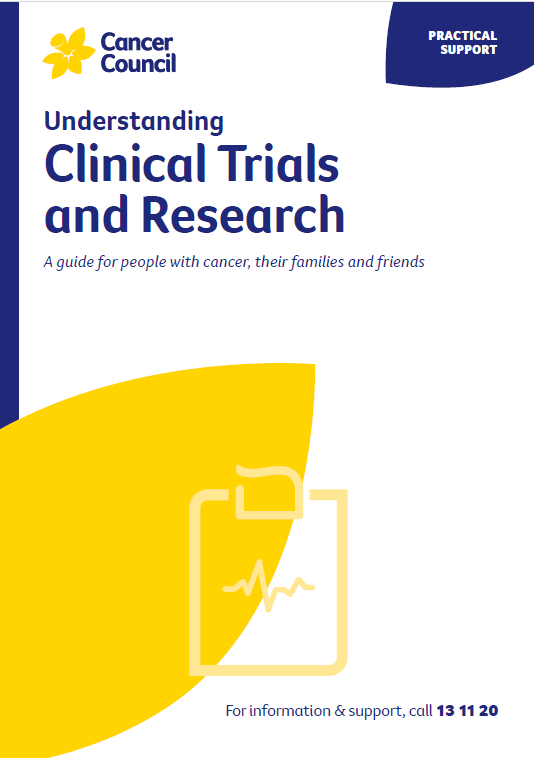- Home
- About Cancer
- Cancer treatment
- Clinical trials and research
- Clinical trials explained
- Randomised controlled trials
- Standard treatment and placebos
Standard treatment and placebos
In a randomised controlled trial, people in the control arm may receive the standard treatment or a placebo.
Standard treatment
This is the current most effective treatment given to people for their disease or condition. For example, the standard treatment for early breast cancer is surgery, often followed by chemotherapy, radiation therapy and/or hormone therapy.
In some cases, the current standard of care is for the doctors to monitor the cancer closely with regular tests and check-ups, and only offer treatment if the cancer progresses. This approach may be known as active surveillance or watchful waiting. For example, active surveillance is recommended for some early thyroid cancers that aren’t causing any symptoms and are low risk, since the risks of treatment may outweigh the benefits in this situation.
Placebo
This is an inactive or “dummy” treatment. It is made to look, taste or feel like the treatment being tested, but it doesn’t have any active (therapeutic) ingredients (if a medicine) or beneficial effect. Examples of placebos are sugar pills and saline injections.
A placebo is used to show whether any improvements are because of the actual treatment or because of other factors linked with being in the study, such as being more closely monitored or simply expecting the treatment to be helpful. If the people on the experimental treatment improve more than those on the placebo, this provides stronger evidence that it is the experimental treatment that is responsible.
Participants will be told if a study uses a placebo, but they won’t be told which treatment they are having, and the research team usually don’t know either.
In cancer treatment trials, placebos may be used:
- together with the standard treatment – for example, one group gets the existing standard therapy plus the experimental treatment, and the other group gets the standard treatment plus a placebo
- on their own, but only when there is no existing standard treatment to compare against an experimental treatment.
Podcast: Making Treatment Decisions
Listen to more episodes from our podcast for people affected by cancer
More resources
A/Prof Brett Hughes, Senior Staff Specialist, Medical Oncology, Royal Brisbane and Women’s Hospital and The Prince Charles Hospital, and Associate Professor, The University of Queensland, QLD; Christie Allan, Clinical Trials Lead, Cancer Council Victoria, VIC; Dawn Bedwell, 13 11 20 Consultant, Cancer Council Queensland, QLD; Joanne Benhamu, Senior Research Nurse, Team Lead, Lung, Colorectal and Palliative Care Trials, Parkville Cancer Clinical Trials Unit, Peter MacCallum Cancer Centre, VIC; Louise Dillon, Consumer; Sabina Jelinek, Clinical Nurse Research, St John of God Murdoch Hospital, WA; Chloe Jennett, Program Coodinator, Cancer Research, Cancer Council NSW; Carmel McCarthy, Consumer; Alison Richards, Research Unit Manager, Medical Oncology Clinical Trials Unit, Flinders Medical Centre, SA; Prof Jane Ussher, Translational Health Research Institute (THRI), School of Medicine, Western Sydney University, NSW; Prof Janette Vardy, Medical Oncologist, Concord Cancer Centre, and Professor of Cancer Medicine, The University of Sydney, NSW.
View the Cancer Council NSW editorial policy.
View all publications or call 13 11 20 for free printed copies.
Need to talk?
Support services
Coping with cancer?
Speak to a health professional or to someone who has been there, or find a support group or forum
Looking for transport, accommodation or home help?
Practical advice and support during and after treatment
Cancer information
Cancer treatments
Learn about common cancer treatments, such as surgery, chemotherapy and radiation therapy
Dealing with the diagnosis
Common reactions to a cancer diagnosis and how to find hope


